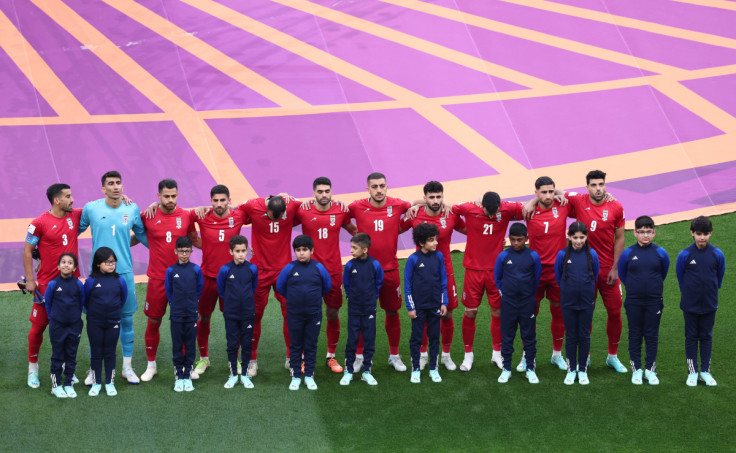World Cup Teams Ditch Anti-Discrimination Armbands Following FIFA Threat
Soccer team captains from several European countries will not wear "OneLove" armbands at the 2022 World Cup after FIFA said that players would be penalized for doing so.
The anti-discrimination armbands are one way that players have decided to speak out against the homosexuality ban in the host country Qatar. The U.S. Men's Soccer team announced last week that it will display a rainbow-colored crest in its training base in solidarity with the LGBTQ+ community.
As reported by ESPN, captains of England, Wales, Belgium, Denmark, Germany, and the Netherlands will no longer wear the armbands after FIFA told players they would be given yellow cards if they entered the field with the bands on. A second yellow card for the captain during a game could risk ejection.
The teams wrote a joint statement explaining the decision.
"FIFA has been very clear that it will impose sporting sanctions if our captains wear the armbands on the field of play," the statement read. "As national federations, we can't put our players in a position where they could face sporting sanctions including bookings, so we have asked the captains not to attempt to wear the armbands in FIFA World Cup games."
Teams say they were prepared to pay fines for the armbands, but after further game penalty threats from FIFA, they have declined to wear them. Article 4.3 of the FIFA equipment regulations state that no clothing or equipment can be worn if it is considered "dangerous, offensive or indecent" or if it includes "political, religious or personal slogans." The organization requires captains to wear armbands provided by FIFA.
"We were prepared to pay fines that would normally apply to breaches of kit regulations and had a strong commitment to wearing the armband. However, we cannot put our players in the situation where they might be booked or even forced to leave the field of play," the statement said.
"We are very frustrated by the FIFA decision which we believe is unprecedented -- we wrote to FIFA in September informing them of our wish to wear the 'OneLove' armband to actively support inclusion in football, and had no response. Our players and coaches are disappointed -- they are strong supporters of inclusion and will show support in other ways."
The OneLove campaign began with the Netherlands and several other European teams following suit. The Dutch were the first to abandon the clothing item just hours before their first match on Sunday when FIFA informed them of the sanctions.
"You don't want the captain to start the match with a yellow card. That is why it is with a heavy heart that we as a UEFA working group, KNVB and as a team had to decide to abandon our plan," the Netherlands team said in a statement.
Offering an opposing option, FIFA announced Monday that its "No Discrimination" captain armbands would be available for all teams throughout the tournament. The organization was previously going to unveil the campaign during quarterfinals.
"FIFA is an inclusive organization that wants to put football to the benefit of society by supporting good and legitimate causes, but it has to be done within the framework of the competition regulations which are known to everyone," FIFA said in a statement.
The 2022 World Cup has been fraught with controversy, not only surrounding Qatar's laws affecting the LGBTQ+ community, but also around the country's human rights concerns involving the construction of the stadium. The Guardian reported last February that over 6,500 migrant workers died while constructing the infrastructure for the global athletic event.
Denmark's team unveiled black jerseys to mourn migrant workers who died building facilities for the event while Australia's team released a video calling for compensation for the migrant family's workers. FIFA had reportedly denied Denmark's request to wear the black jerseys, which read "Human Rights for All," earlier this month.
The group had warned against political messaging prior to the start of the tournament.
"Please, let's now focus on the football!" FIFA president Gianni Infantino and secretary general Fatma Samoura wrote in a letter sent to teams in early November. They also added: "Please do not allow football to be dragged into every ideological or political battle that exists."
The World Cup began on Sunday and concludes on Dec. 18.

© Copyright IBTimes 2024. All rights reserved.




















